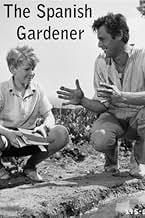The very first frame brilliantly sets the mood and theme. As the movie opens, young Nicholas is isolated on the frame's left side leaving the remainder to a void, specifically, the gloomy interior of a British Embassy. He is peering out a window at a busy street below. Soon we hear raised voices from the next room. Then, two men enter, and the story swings into action. But this first glimpse shows us what we need to know—a lonely, curious boy separated from the world by elegantly impersonal surroundings and apart from adults in his life. In effect, the movie's 90-minute remainder shows us the boy's difficult journey from that detached space above to the worldly space below.
Naturally, a human interest story like this depends heavily on the quality of the performances. Fortunately, they're almost uniformly outstanding, particularly Hordern's. As the emotionally bottled-up father he's simply superb. He's very good at concealing unwanted emotions before they betray inner conflict and possible weakness. And being a diplomat in British employ, the self-discipline goes logically with the job. The trouble for Brande (Hordern) is that he has allowed that professional demeanor to take over his private life, as well, resulting in an emotional prig who's already lost his wife and is in the process of losing his son. The latter are quietly wrenching scenes, especially when the Spanish gardener Jose (Bogarde) arrives and the boy's conflicts become painfully evident.
It's significant that the boy's mentoring companion is made a gardener—that is, a man who knows how to make young things grow. (Note too how quickly the screenplay connects the handsome Jose with a girlfriend, thereby forestalling possible innuendo.) Ironically, then, it's the understanding menial and not the father, who provides Nicholas with the needed opportunity to grow. Thus, when Nicholas doffs his white shirt to join in the gardening and the sun, it's a highly symbolic act, and I was reminded of those imperial times when the conquering British were disparagingly said "to go native" by adopting customs from the locals. As a result, the rivalry between the cultured diplomat and the athletic gardener can be taken in that broader sense as involving more than matters of personal jealousy. Thus Dad's first admonition to Nicholas is to put the shirt back on, and all that signifies.
To me, the movie's first two-thirds come across as a triumph in the art of stylistic naturalism—the riveting seaside vistas, the subdued performances (excepting Cusack's overdone Garcia), along with the sensitive dialogue— for example, note the subtle lengths Robert Buford and others go to so as not to offend the insecure Brande. However—in passing —I do think the accusatory line about failing as a man is unnecessary and contrary to the film's strength, a strength that lies in "showing" rather than in "telling". In short, we've already been shown Brande's key character failing, no need to tell us.
Unfortunately, the movie's final third turns baldly melodramatic and contrived. The stagey storm and chance meetings at the mill may provide some dramatic action, but they also undercut the modulated naturalism that's so effectively defined the movie. I don't know how much of the melodrama was in the Cronin novel, but the sudden departure prevents the movie from being the classic it should have been, at least in my little book.
Nonetheless, it's an unforgettable film in so many ways. Of course, the slow pace is not everyone's cup of tea-- which may be why the last part was turned into melodrama. Still and all, there's so much that's impressive, from Whiteley's affecting performance to Bogarde's smiling approach from the bosom of the seaside. I guess the story could be taken as an allegorical comment on what happens to even the coldest-climate British when introduced to the soothing rays of the Spanish Riviera. However that may be, it remains a moving film of memorable moments and one of my favorites.

































